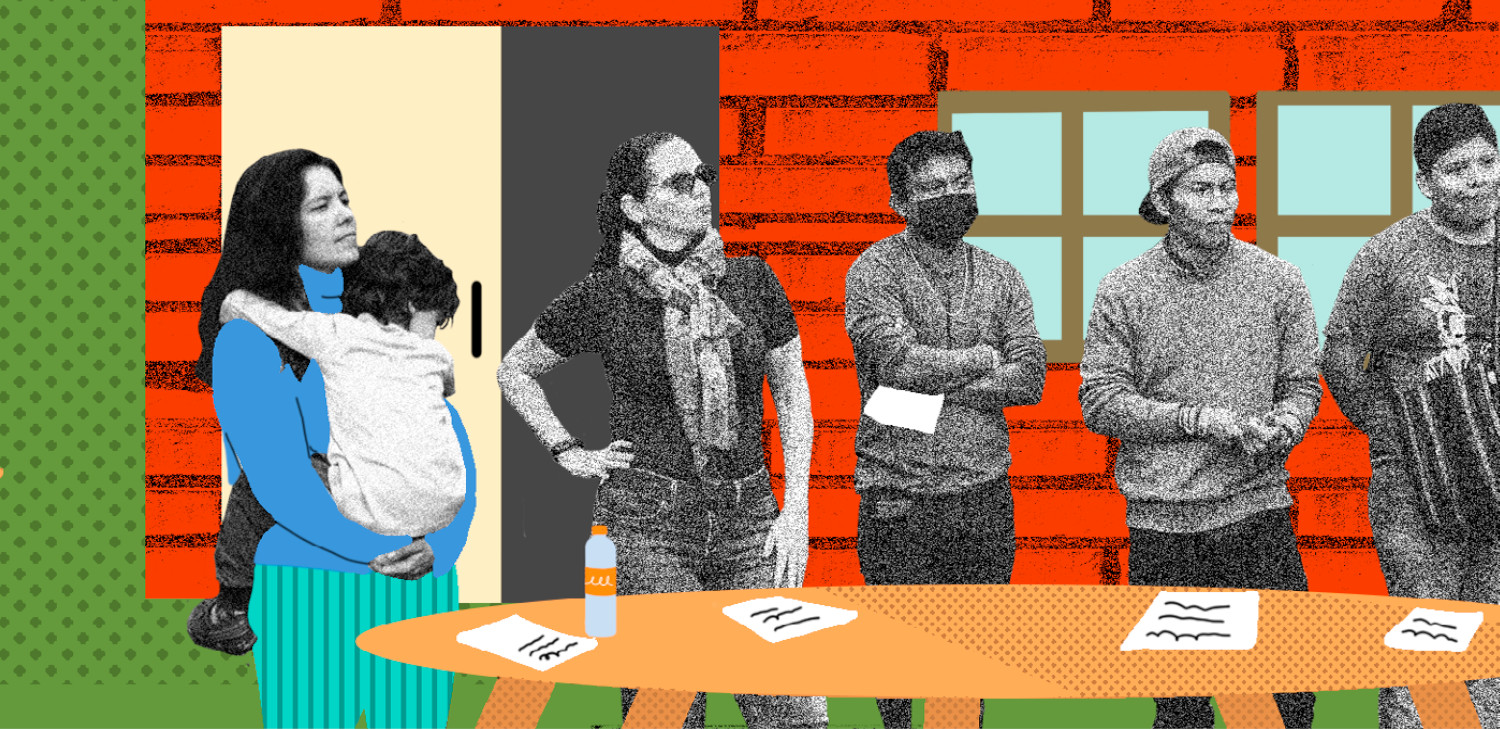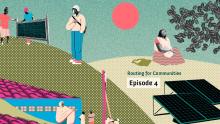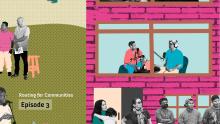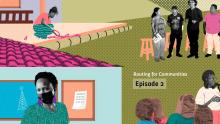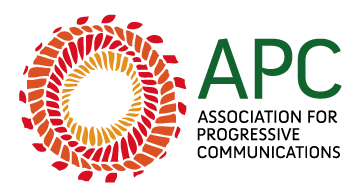#5 Learning from communities in Argentina
In this episode you will travel to a rural area in Córdoba, Argentina. There we will get to know the Quintana Libre initiative. It’s a community network in the township of José de la Quintana, which was developed with the local community by an organisation called AlterMundi. For this story, we talked to Jessica Giudice, a Quintana Libre member and AlterMundi co-founder.
Also in this episode, we talked to Natalia Vinelli, who is also in Argentina, but based in the country's capital city of Buenos Aires. She is an activist in social communication and deputy director of Special Projects at ENACOM – the country’s regulation authority for communication media and telecommunications.
With a strong community networks movement, in the last years, Argentina started to develop state programmes to guarantee access to the internet through groundbreaking policies developed in participatory processes.
“Routing for Communities” is a twelve-episode podcast. Here you will be able to listen to the life stories of people who build inspiring community-led projects to connect the third of humankind that is still living offline.
Stories and voices that are intertwined, connected by one thread: building internet and communication community networks.
Hello! I am Renata Porto, I live in São Paulo, Brazil, and I am the host of this 12-episode season around community-led initiatives on internet and communication.
In this fifth episode, you will travel to a rural area in Córdoba, Argentina. Over there, we will get to know Project Quintana Libre. It is a community network in the township of José de la Quintana, which was developed with the local community by an organisation called AlterMundi.
"The community network has taught, inspired, and educated me as well, regarding time, relationships and learning experiences on both ends."
For this story, our team talked to Jessica Ríudice. She is Quintana Libre's member and co-founder.
We also talked to Natalia Vinelli, still in Argentine territory, but based in the country's capital city of Buenos Aires. Natalia is an activist of social communication and deputy director of Special Projects at ENACOM – the country’s regulation authority for communication media and telecom communications.
“It is the first time an exclusive community network is developed without the need to compete with the private sector".
So please hop on board for this trip to South America!
Our video call with Jessica for this podcast started out with some connectivity issues and instability. Thus, the cameras had to be turned off.
“A ver, un minuto, no sé si escuchas ahí.
–Sí, te escucho. ¿Me escuchas?
Voy a colgar mis auriculares.
–Dale.
A ver, háblame ahora.
–¿Me escuchas bien?
Sí, sí, sí.”
Jessica explained to us that she is in a rural area of Córdoba, but that she was going to the province's capital that very same day in order to get a transformer to improve local connectivity.
She's talking straight from the small town of José de la Quintana. It has a little over 4,000 inhabitants and is located in the province of Córdoba, which is Argentina's second most populated province. There are 3.5 million people out of the 45 million inhabitants Argentina has.
The experience we are going to discuss today took place in this town: the Quintana Libre's community internet network. The project takes the internet to dozens of other communities in Argentina's central region. They receive support from the AlterMundi organisation, of which Jessica is a member.
“My name is Jesica Giudice, I'm 37 years old . I've learned about the concept of free softwares about 20 years ago. Since the very beginning, the idea moved me, like love at first sight . And little by little I got involved in different events, as I felt that my role was to be able to articulate the people who wanted to learn with the people who could teach and materialize and facilitate the necessary materials and spaces for the idea to come to fruition. And that ended up guiding me, taking me down an endless path towards community networks. I became fully invested when I moved here, to the town where I live, and the need for connectivity demanded a shift to a rural environment, a place where telecommunications really needed to be improved. It is the community network that has taught me, inspired me, and also educated me, not only technical terms, but also in time, in relationships, in learning on both ends.”
Jessica was born and raised in middle and small towns in the Province of Buenos Aires and had been living in the national capital before moving to José de la Quintana, where she is living for 13 years now.
This small town is located 60 kilometers away from the city of Córdoba, the biggest city in the province.
During the interview, Jessica also says that the town does not have a well defined economic activity. There are both small farms and entertainment clubs for the families who live nearby.
Most of the streets are dirt roads and maintenance is carried out by the neighbours' co-op. This is a region full of mountains and hills, as well as small trees, thorns, and bushes everywhere.
This is where the Quintana Libre community network was born.
"The community network here in La Quintana was born around 2011-2012. Started off as an organization between three houses. Over time, as the network made it possible, new families started to join and, throughout its history, it has changed its members, families, and houses a lot. Also the hardware, the software, the equipment, the antennas, the organization, the mood, right? Like anything that's organic and dynamic. So a lot has changed because from the beginning it was intended to be a model for other networks, and the model has to be replicable, it has to be accessible, it has to be affordable. So, in this time frame, we have changed the technologies, the antennas, the way of manufacturing, the way of organizing to be able to bring this information to other communities. Not that they do it the same as here, but that part of the path is discovered and each community finds its way to explore it.”
Quintana Libre's community network includes, aside from José de la Quintana, the neighbouring town of San Isidro, as well as the next one called Los Molinos. They are all part of the same network. However, in Los Molinos the network has its own identity, name and local management, being called "Molinos Comunitários".
“So what they did in a town from Cordoba called Quintana is to establish a network called Quintana Libre and they invited the residents of this town to set up networks. They invite, above all, the people from the town, young people, people who want to connect, to start trying what the internet is. In this very same process, they are learning a lot about antennas, routers, connections, signals. Besides, in this case, with homemade elements, they are putting together a network that allows eight towns in Córdoba to be connected.”
Since this is a pioneering experience in this kind of innovation in the country, Quintana Libre has used various types of technologies throughout the years. The objective is to take the internet to different towns between the mountains. In some cases, these places only had a very precarious cell phone signal.
“Quintana Libre was born as a test bed, as a learning experience. It has a pretty diverse technology. Not only does it have the 'switch', which is the hardware, the router, which we designed from AlterMundi, but it also has commercial teams. Fortunately, now shortly, we are going to be updating all the Libre Routers with the funding we received from the state for this purpose. And these are mainly our Wi-Fi networks. But it has two connections. One through José de la Quintana to a mountain in a nearby town and from there there is a 52-kilometer Wi-Fi jump to the city of Córdoba. And in coordination with the National Technological University and the National University of Córdoba, we use the inter-university fiber to reach the Arsat fiber, which is a public-private company, mostly owned by the state, which manages the national infrastructure. Well, we have a fiber optic connection from Arsat in Los Molinos too and since both networks are interconnected or, in fact, technologically just a single network with two different management units, we can go out on one side and all the towns on the other.”
Jéssica is one of the founders of AlterMundi. In her journey with this organisation, she coordinated and followed more than 20 community-led networks from their birth to their development. They are now part of the Argentina's Community Networks Dome. At the same time, she knows a dozen of other experiences happening beyond this articulation in the country.
But what is AlterMundi?
“AlterMundi was born primarily as a group of friends who shared similar dreams towards the creation of proper technologies under cooperation between peers. Inside this world of community-led networks we take care of many different aspects, such as the hardware, software, infrastructure design, education, creation of contents and also articulation with other organizations and state entities trying to establish policies and regulations.”
Nowadays, AlterMundi is also dedicated to working with other technologies, for example, for growing foods in small farms and in partnership with social movements. Everything is done within the community and built colléctively. A fundamental path for self-determination and sustainability of community-led projects.
From José de la Quintana, in Córdoba, we'll travel to Argentina's national capital, Buenos Aires. Natalia Vinelli lives there. She is responsible for special projects in Argentina at ENACOM, a Communications National Entity.
“My name is Natalia Vinelli, I'm a journalist, a social communicator, professor at Universidad de Buenos Aires, activist for social communication, founder of Barricada TV, which is a community-led television channel. The channel is properly licensed and is broadcast through digital television in national territory. Since 2020, I have worked as Special Projects' Deputy Director at ENACOM Argentina, which is the entity that regulates communication media and telecom in the country, aiming at taking connectivity to low-income neighborhoods, rural communities, and native peoples' territories."
Argentina is a vast country in terms of territory. It is in fact the eighth one in the world. It is located in the extreme southern point of South America and faces many difficulties in terms of telecom infrastructure, but also in terms of access to water, electricity, and sewage systems in many regions. Just like in other South American countries, Argentina is also marked by major social and economic disparities.
When it comes to connectivity, the country is ranked with a higher penetration of internet access in the Southern Cone, with 54%. However, there are enormous inequalities.
In the last years, Argentina started to develop state programs to guarantee access to the internet. For the first time, money from a Universal Service Fund has been used towards financing community-led networks.
Through groundbreaking policies, it was possible to consíderably raise the number of Argentine networks, such as the Barrios Populares and the Roberto Árias programmes.
Within ENACOM, there is a program for the connectivity of impóverished communities in Argentina. The program has covered 100% of the expansion and installation of infrastructure to provide internet access.
Besides, there are specifications making sure that a social centre with computers for all 2,500 citizens be established. According to Natalia, over 800 neighbourhoods are going through some kind of construction and there are over 70 of them with funded projects.
“The other program that we did is the Roberto Arias program for community networks. It is the first time an exclusive community-led network program is developed without the need to compete with the commercial carriers and, in this case, the regulation process was simplified and much more expedient. They are obviously smaller projects for smaller communities of less than 5,000 inhabitants. But what I am interested in highlighting in relation to this particular program is that we wrote it together with the social movements.”
AlterMundi is now carrying a Semillero, or "Seedbed" in English. This is an initiative to support the community networks to deal with state bureaucracy and apply to the Roberto Árias program.
Recently, they celebrated the first-ever Universal Service and Access Fund grants focusing on community networks in Argentina, with the approval of the applications made by both the José de la Quintana and Los Molinos community networks.
This scenario has turned Argentina into a pioneer in incorporating community networks among the beneficiaries of the Universal Service Funds. These funds were created by governments in several countries precisely to subsidise the promotion of universal access to telecom services, but many of them still leave community-led initiatives aside.
Community networks like the ones we saw in this episode have been raising an important point to regulators: instead of insisting on external solutions, state programs should place the voices of the communities who experience such realities at the core of the response to the digital divide.
Through participatory processes, the community networks movement can help to shape more efficient connectivity policies and regulations.
"Well, none of this would've been possible if there had not been a social movement, which set an agenda, and which also defined that their peers from the social movement occupy spaces in the state, to push that agenda towards reality. That is, if there wasn't such political intention, no measure would have come out around community networks.”
And with more of these projects worldwide aiming partnerships and building community networks with the local community, our episode has come to an end.
As always, I hope the stories told by voices of two women were a source of learning and hope, at the same time leading us to act, together and collectively.
If you wanna know more about AlterMundi, ENACOM and Argentine public policies, we've posted links in the description of this episode.
If you’ve liked this podcast, please help us share these voices. recommend it to those you know will appreciate it as well.
You can follow the season on the main podcast platforms or on APC’s website: routingforcommunities.apc.org.
We’ll meet again soon, with new experiences and stories from community-led networks that are also connected to our lives.
For the sixth episode, we will get to know Common Room, in Indonesia. These are connectivity, communications and artistic initiatives mainly in the West Java Province.
You've listened to the fifth episode of “Routing for communities: an audio journey tracing community connectivity around the world”. This is the podcast of the Local Networks initiative, a collective éffort led by the Association for Progressive Communications (APC) and Rhizomatica. Production: Rádio Tertúlia.
In this episode, you've listened to audio excerpts from Argentina's TV Pública.
Thanks and see you next time!
Credits
This podcast is an initiative from the Association for Progressive Communications (APC) and Rhizomatica, produced by Rádio Tertúlia.
Script and production: Vivian Fernandes.
Presentation: Renata Porto.
Editing and voiceover: Beatriz Pasqualino.
Sound: Lua Gatinoni.
Coordination: Beatriz Pasqualino and Débora Prado.
Consulting Board: Bruna Zanolli, Cynthia El Khoury, Daniela Bello, Flavia Fascendini, Kathleen Diga and Nils Brock.
Translation: Thiago Moyano.
Illustration: Gustavo Nascimento.
Web design: Avi Nash and Cathy Chen.
